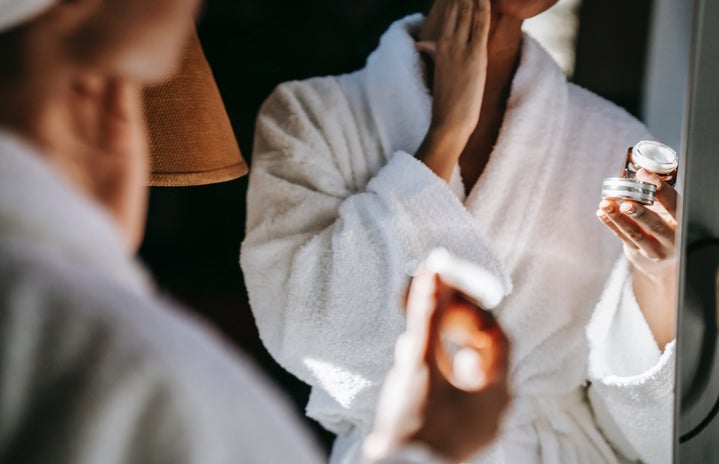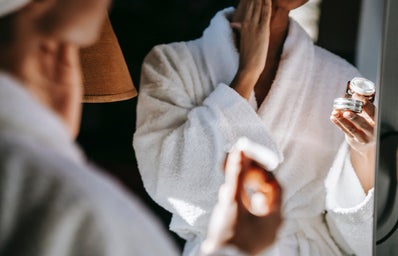Your skin can be your worst enemy sometimes, I know that from experience. Having issues with acne, hyperpigmentation, dryness or texture, especially on your face, can be torturous. As someone who had crystal clear skin while going through puberty and all the way through high school, in the fall of my junior year when I started having hormonal acne issues, I freaked the absolute F out (ask my friends and mom).
I was confused, embarrassed and stressing hard. I didn’t understand why I was getting these angry, painful, red bumps on my cheeks so consistently. If I ever had pimples in the past, they would appear on my forehead or chin, never on my cheeks. I had always taken decent care of my skin, cleansing and moisturizing as one should each day, so I was very confused as to why I was breaking out so badly.
I am a chronic researcher; every time I watch a movie, I know the entire life stories of everyone in it by the end. So, Google became my best friend at this point, probably for the worse, but I couldn’t help it.
“What causes acne on cheeks?”
“Painful red bumps on face”
“How to get rid of cheek acne”
All I ever got was the usual “drink water!”, “stop drinking alcohol”, “wash your face”, “moisturize”, and it was so frustrating. I bought every product I could find that I heard might help and hoped I would eventually come across the miracle gel. Long story short, I didn’t. Nothing was helping and my self confidence was plummeting, so I finally convinced my mom it was time to see a dermatologist.
The first time I went, I received two topical creams which really didn’t help me at all. I have really sensitive skin, and the prescription strength creams made my skin dry and irritated, which just made everything look worse. Once I struggled with that for long enough, I convinced my mom I should go back to the dermatologist. On this visit, I met my current doctor and life saver.
It was here that I explained the problems I was having with my current routine and we discussed treating my skin from the inside out rather than using topical methods. She asked me if the blemished appeared near my period or at random times. I thought about it and it was usually the week before or of my period; this meant that my issues were hormonal. She then told me that there was a medication I could take called spironolactone that could potentially help me out a lot. Now, I’m no scientist, but here was my understanding of how it works; spironolactone was originally used to treat people with high blood pressure, but it was found that it also blocks a hormone called androgen which produces testosterone. Apparently, although it’s not the only possible cause, hormonal acne can occur in females when there is too much testosterone in the body. This medication is thought of as Accutane’s less serious cousin; in case you don’t know, Accutane is an aggressive but effective treatment that people with severe acne typically use to alleviate it when nothing else works. My doctor told me that my skin wasn’t in bad enough shape to be a candidate for Accutane (it’s so aggressive that they won’t let just anyone go on it), so I started taking spironolactone and have been on it for about a year now.
However, that was not a fix-all solution. While the medication definitely helped me a lot in terms of prevention, my skin was left scarred and damaged from the months and months of messing with it before that point. So, I took it upon myself to look into using skincare products to improve my skin overall, not just treat my acne. Things that I had previously never thought of, like my skin’s moisture, tone, and brightness became important to me because I knew that improving those things would only improve my skin in general, subsequently helping my acne to heal and subside.
I started researching (credible sources this time) to find the products that would help my skin’s issues and create a well rounded routine for myself. I’ve made a few amendments over the last few months and I officially feel like I’ve found the right mix.
Here is my daily routine in case you need some guidance (remember to start simple and work each product in over time as to not overwhelm your skin):
In the mornings, I wash my face when I wake up with the CeraVe Hydrating cleanser. Then, I tone my face with Paula’s Choice 2% BHA Liquid Exfoliant; that stuff is great, it helps unclog pores and even texture without irritating the skin. After toning, I use The Ordinary’s Ascorbyl Glucoside 12% (Vitamin C) serum and then Paula’s Choice Hyaluronic Acid gel as well as their Niacinamide serum. I then use Paula’s Choice Azelaic Acid cream. I then round it out with CeraVe’s Moisturizing Lotion. At night time, I do the same routine but without the Vitamin C and Azelaic Acid, using Differin Gel (which I highly recommend to anyone struggling with acne) instead.
If your problems sound similar to mine, connect with a dermatologist if you can and ask about medication options. Remember, results are not immediate! If medication isn’t something you’re open to trying to cure your skin woes, try to research your specific skin issues and target those with recommended products. Most importantly, BE PATIENT; I know it’s difficult, I’m one of the most impatient people on the planet, but time really does heal all. ALSO, try not to pick at or mess with your skin as well, it will only lead to discoloration and texture issues. Acne is infuriating and confusing, but just know that you’re beautiful no matter what. Do the research, put in the time, and it WILL get better!


